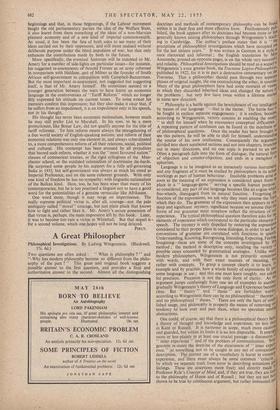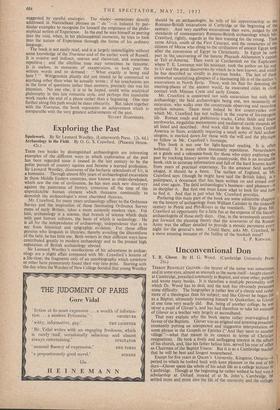A Great Philosopher
Two questions are often asked : " What is philosophy ? " and ' Why has modern philosophy become so different from the philo- sophy of the past ? " This great and original book suggests a possible answer to the, first question, and provides a final and authoritative answer to the second. Almost all the distinguishing
doctrines and methods of contemporary philosophy -can be found within it in their first and most effective form. Posthumously pub' lished, the book appears after its doctrines had become more or leas generally known among philosophers through Wittgenstein's teach' ing in Cambridge. The author's preface states that it is " thY precipitate of philosophical investigations which have occupied 1110 for the last sixteen years." It was written in German in a style?' once rhetorical and informal ; the English translation by Mil Anscombe, printed on opposite pages, is on the whole very successfa and reliable. Philosophical Investigations should be read as a sequel t° Wittgenstein's even greater book, the Tractatus Logico-PhilosophicA published in 1922, for it is in part a destructive commentary on the Tractatus. That a philosopher should pass through two separate phases of original insight, the one contradicting the other, is unusual' Many of the great philosophers have had some moment of vision' in which they discarded inherited ideas and changed the nature cl, the problems • but very few have twice within a lifetime started in some new direction.
" Philosophy is a battle against the bewitchment of our intelligell° by means of our language "—that is the theme. The battle has t0 be fought in endless separate engagements ; it is endless, because, according to Wittgenstein, victory consists in enabling the reade,l, " to shift for himself when he encounters conceptual difficulties. , A repeating pattern of confusion can be found in the indefinite set of philosophical questions. Once the reader has been brought to see this pattern, he will be able to shift for himself, understanding the source of his own confusions. Consequently the argument' divided into short numbered sections and not into chapters, branches out in many directions, and no one topic is pursued to an end Often a paragraph falls into the form of dialogue, the natural fords of objection and counter-objection, and ends in a metaphor of aphorism. Language is to be imagined as an immensely various instrument' and any fragment of it must be studied by philosophers in its actual workings as part of human behaviour. Insoluble problems arise as soon as the meaning of an expression is considered apart from i° place in a " language-game " serving a specific human purpose,! so considered, any part of our language becomes like an engine whicY free-wheels, disengaged from its natural function. Forgetting th° function of the expressions, we ask why they must assume the fed which they do. The grammar of the expression then appears to us!, deep and significant mystery, significant because we assume that tri! forms of our grammar must somehow reflect the structure of ots experience. The typical philosophical question therefore asks for tild elements of experience which correspond to the particular elements of speech. The mystery is only dispelled by restoring the expressions considered to their proper place in some dialogue, in order to see Ito!! conventions of grammar are correlated with functions in speed°. Understanding, Knowing, Recognising, Intending, Expecting, Feeling Imagining—these are some of the concepts investigated by thl method ; the method is descriptive only, recalling the variety °f possible cases concealed by grammatical analogies. Unlike mall modern philosophers, Wittgenstein is not primarily concerned with words, and with their exact nuances of meaning, but rather with concepts. To grasp a concept clearly is to learn, I". example and by practice, how a whole family of expressions fit some language in use ; and this one must learn.roughly, not askins,,, for precision. Precision is not the only form of clarity. As t' argument jumps confusingly from one set of examples to another,' gradually Wittgenstein's theory of Language and Experience become, clear. But " theory " and " thesis " are forbidden words,' according to Wittgenstein there can be no philosophical " theories and no philosophical " theses." There are only the facts of estaY. lished usages and philosophy is properly the means of removing 0 tendency to look over and past them, when we speculate atom abstractions.
One could, of course, say that there is a philosophical theory her!: a theory of thought and knowledge and experience, no less 013' in Kant or Russell. It is narrower in scope, much more cautids and guarded, but within its limits it is no less disputable. It emerge( more or less plainly in at least one crucial passage—a discussion ,° " inner experience " and of the problem of communication. yid genstein re-states the doctrine of the elusiveness of " inner ext/°s,;
ce
en," as something not to be caught in any net of convention': description. like correct use of a vocabulary is learnt in comnlY:: experience, and there must always be some common "criteria by which we separate truth from error in describing sensations al!, feelings. These are assertions more freely and directly made 11: Professor Ryle's Concept of Mind, and, if they are true, they are 06 to the philosophy of Hume and of Russell ; but they are not licr shown to be true by continuous argument, but rather insinuated and suggested by careful analogies. The reader—sometimes directly addressed in Nietzschean phrases as " du "—is induced by par- ticular examples to recognise for himself the emptiness of the philo- sophical notion of Experience. In the end he sees himself as peering into the void, when, in his philosophical moments, he tries to look into the nature of Experience through the forms of his ordinary language.
The book is not easily read, and it is largely unintelligible without some knowledge of the Tractatus and of the earlier work of Russell. It is evasive and indirect, uneven and rhetorical, and sometimes repetitive ; and the sibylline tone may sometimes be tiresome. It is useless, in moments of exasperation, to look past the written words and to demand : " What exactly is being said here ? " Wittgenstein plainly did not intend to be committed to anything other than. what he actually wrote ; if his conclusions are in the form of questions rather than answers, precisely this was his intention. No one else, it is to be, hoped, could write analytical philosophy in this late romantic style, and perhaps this inimitable work marks the end of a phase rather than a beginning. One step further along this path would be sheer obscurity. But, taken together with the Tractatus, the book represents an achievement which is comparable with the very greatest achievements of the past.
STUART HAMPSHIRE.



































 Previous page
Previous page